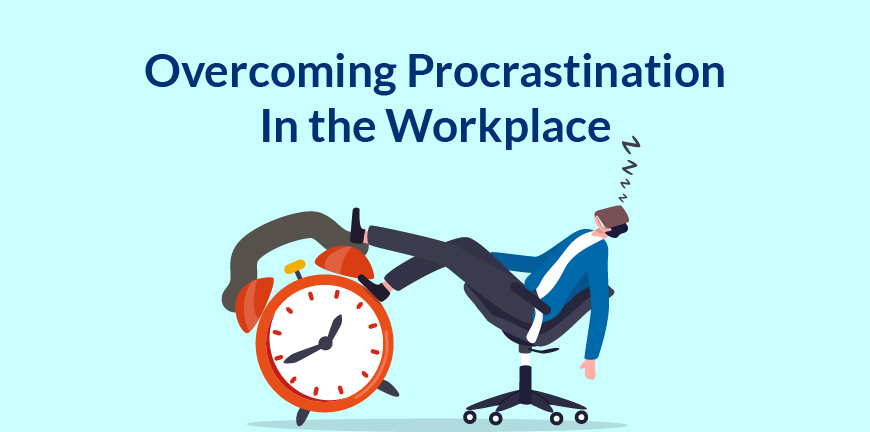
What is Contract Staffing? Definition, Process and Benefits
16/06/2023
What is Extended Reality (XR) and its Impact on Businesses
21/06/2023Tom goes to work every day, and if it is the mundane, run-of-the-mill kind of job, he has no problem. But just when he is asked to step out of his comfort zone to do something new and which might require a bit of extra effort, he exhibits some resistance. He is not vocal about it and may even continue to do the job for a while. But then he stops abruptly and starts to “procrastinate”.
Procrastination Meaning & Definition
You will hear very often people telling you not to procrastinate. But we all carry this invisible burden as unwillingly as anyone else, and we are fully aware it is undesirable too (if it continues for a long time), and have a tough time ridding ourselves of it. Let us not equate laziness with procrastination. You could be lazy for no reason at all, but the same is not true for procrastination, and as for all things that we can attribute a reason to, there’s a cure for it as well. Thank God, and it’s probably easier than the one for laziness.
What is Procrastination?
Procrastination always has an emotional discomfort somewhere at its core that keeps pulling you down and making you want to put what you must do today away until a much later date. Understanding the emotional discomfort, what it is, how it happened, and how to remedy it can help in overcoming procrastination.
What are the 2 Types of Procrastination?
There are two major types of procrastination that people generally go through.
Type 1: I am unable to start
This is the most common type of procrastination. People do not even begin the work they need to finish, because they do not know how to get started. In most cases, the task is too intimidating and difficult to accomplish. An example would be your boss asking you to write a playbook on performance management and the techniques to implement it.
Now, performance management can be quite a complicated topic for a beginner, even if you do speak to a subject matter expert and gather useful information. Just the thought of how to implement a performance management system can make you nervous and want to put it off to a further date; a definite case of procrastination it is.
Talking about the causes of procrastination, sometimes it is also because you feel inadequate to do the job. You think about how you could finish the task when you have not handled a similar task before. You question how skillful you are and if you have the dedication to get it done.
There’s a third reason you might procrastinate. You may not want to do the task, to begin with. You may feel it is a kind of imposition that does not interest you, but what you need to get done to escape your manager’s wrath.
Type 2: I am unable to finish
In this second type of procrastination, the person is unable to finish a task because he feels he is not up to the task or because the complexities are ever-increasing in the task, and he gets intimidated. It could also be that he fears other people would berate the work once it is complete. In all these cases, the job is nearing completion when he feels he is not up to it and starts procrastinating.
Reasons for procrastination can be plenty, but one of the main reasons is because of the search for perfectionism. You put so much pressure on yourself that you are unable to complete the work. You feel that it will never be up to the lofty standards you believe in.
This type of procrastination, that of being unable to finish what one starts, poses a greater danger in the workplace, as the person has already taken the job but has not completed it. At this point, it may be difficult for the manager to assign a new stakeholder or restart the project with a different person/team.
The Brain During Procrastination
There are several biomarkers in the brain for maladaptive procrastination, affecting as many as 17% of people. Through prediction analysis, scientists concluded that brain morphological dynamics can predict procrastination with very high accuracy.
The study considered several aspects of human thinking, such as self-control, emotions like happiness or sadness, and the prospection networks in the brain during procrastination, and helped identify these biomarkers.
A significant positive correlation with the gray matter volume (GMV) in the Parahippocampal gyrus (PHC), left insula, anterior cingulate and gyrus (ACC), and a negative correlation with GMV of dorsolateral prefrontal cortex (dlPFC) and the gray matter density of ACC was exhibited by individuals during procrastination.
Can Procrastination be Good?
Scientists have identified procrastination as a problem. They have identified the types of procrastination and can even predict when you will procrastinate. Now onto the question of how desirable it is or can be
What are the Effects of Procrastination?
Extreme procrastination is not desirable, but if the person concerned recognizes that it is because of his/her search for perfection that it’s happening, then it might seem a little desirable. This is because once the person realizes that he/she is a perfectionist, then they only need to arrest that emotion and get over it by repeatedly trying and failing, and finally succeeding at what they are doing.
Also, according to Grant, moderate procrastination can help your brain focus on a single idea, think about it, and come up with creative and innovative ideas that will help you solve a problem. This is, he argues, the original way that great thinkers work towards solving a problem with ideas.
Is there another benefit to procrastination? There is another very important benefit to it. It is a source of great energy to the body. When the mind procrastinates on something, there is a great fear that things will not work out, which in turn releases adrenaline in the body. This adrenaline helps you conquer fear, complete the task quickly and successfully.
Another benefit of procrastination at work is that if you do continue to avoid the task you should complete, then you will find other tasks a lot easier than it is. This means that you will complete them with ease and then move on to this particularly daunting task much later. You might get some confidence and finally complete this one, too. But for such a benefit to truly shine at the workplace, you do need an empathetic manager who understands what is happening to you.
10 Effective Ways to Avoid Procrastination
Let us face it, as human beings, we have all procrastinated at one point in time or the other, knowingly or unknowingly.
And the million-dollar question remains- How to overcome procrastination?
Here are some Solutions to Stop Procrastination
1. Change your environment
If you find that your procrastination is linked to the cleanliness of the place or lack of organization, get your workplace organized, clutter-free, and clean.
2. Create a timeline and assign specific deadlines
Break large tasks into smaller, manageable ones and set deadlines to complete each of them, but be sure to let it be slightly flexible, so you don’t feel too much pressure.
3. Re-clarify your goals
Take a step back and inspect if your current goals are aligned with what you really want to do at work. If not, you must see how they must be changed. And is there anything that you can do at work too, keeping the goals as they are?
4. Reduce the number of decisions to make
Reduce the number of decisions you need to make. Simple decisions like Should I eat this or that? Should I wear this or that? Will it be okay if I say this or that? Apart from very crucial situations, call off the decision-making and go with what you would normally do. This will save you from decision fatigue, which could lead to procrastination.
5. Stop overcomplicating things
Make things easier and do not imagine difficulties that do not exist. Think rationally and see what does and what does not impact you, and what things you do have the most impact. Stick to just high-impact causes and outcomes, and all will be well.
6. Reward yourself
When you have done a good job, take a break, and if you have completed a project, take a vacation if you need to. Catch that movie you never saw because you were too busy. Rewarding yourself helps you develop a positive attitude towards work, and it acts as a motivator and helps kick the procrastination habit.
7. Hang out with a motivation buddy
If rewards don’t motivate you, then perhaps a person can – you need to listen to something motivating to get over procrastination or not do it at all. Words have an unusual power and influence over people. A motivation buddy can keep you on the right track by telling you what you get to gain by accomplishing something.
8. Take a break
Fatigue can play a key role in procrastination, detracting you from getting the work done. If you take a break for as little as five minutes, it can sometimes drive the fatigue away, keeping you active and energetic, overcoming procrastination.
9. Tell your dear friends about your goals
Your friends are with you most of the time, especially close ones at the workplace. Telling them about your goals, and them reminding you what is there for you to achieve, can be a constant driver for you and help you overcome the steep slope of procrastination.
10. Find someone who has already done it!
By hearing from people how they accomplished what you are about to do, you can learn, not just from what is to be done, but what not to do as well. This will give you more clarity on the path to success and how easy or difficult it will be. You can be better prepared, and when you know the odds, you will be more courageous and procrastinate less.
Contact Us For Business Enquiry

Rajkumar Shanmugam
Rajkumar Shanmugam is the Head of HR at ALP Consulting, bringing over 19 years of comprehensive HR leadership experience across India and international markets. His expertise spans talent acquisition, employee relations, performance management, compliance, and HR transformation. Rajkumar has a proven track record of driving people-centric initiatives, enhancing workplace culture, and aligning HR strategy with business goals. With extensive experience in US staffing operations and global mobility, he continues to lead organizational excellence through innovation and employee engagement.




